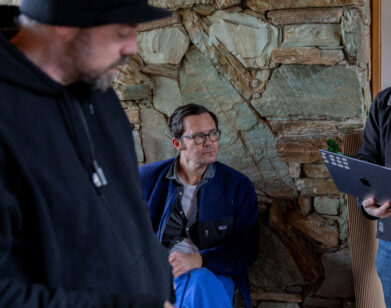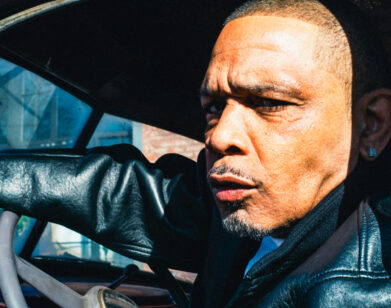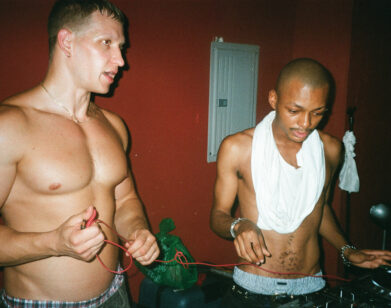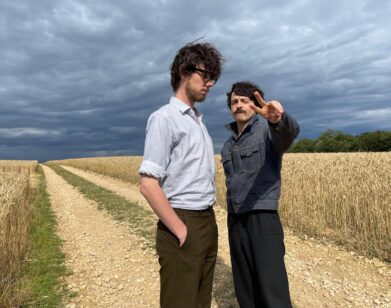IN CONVERSATION
Holt McCallany Talks to David Fincher About The Iron Claw and the Role of a Lifetime
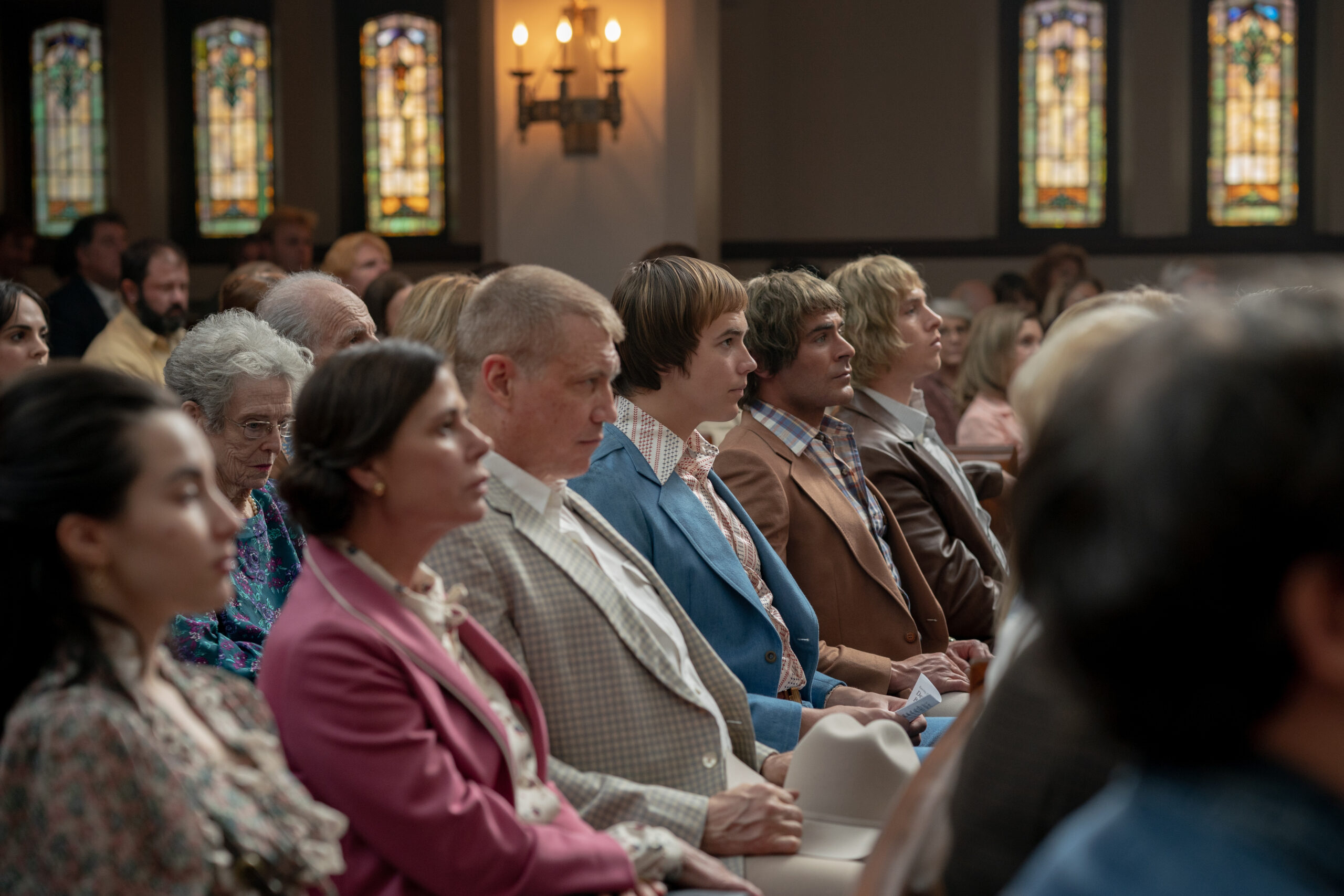
After casting Holt McCallany in Alien 3 and later in Fight Club in the types of tough-guy roles that have largely defined his four-decade career, David Fincher finally let the 60-year-old actor showcase his softer side as FBI agent Bill Tench in Netflix’s psychological thriller Mindhunter. It was that performance, in which McCallany was able to balance steely professionalism and quiet melancholy, that earned him a meeting with director Sean Durkin, who was looking for the right person to play the patriarch of the Von Erich clan in The Iron Claw, his biopic of the legendary Texas wrestling dynasty. As Fritz Von Erich, a loving but severe father who pushed his four sons (played by Zac Efron, Jeremy Allen White, Harris Dickinson, and Stanley Simons) beyond their limits—often with tragic results—McCallany is earning the best reviews of his career, and even, to his own shock, some Oscar buzz. As he told Fincher over Zoom a couple of weeks ago, he’s still letting it all sink in.
———
DAVID FINCHER: Hey Holtster! How have you been?
HOLT MCCALLANY: I’ve been great David, because there were a couple of articles, one in Variety, one in Vulture, that picked me as somebody who could get a possible Academy Award nomination for Supporting Actor, even though it’s going to be a very tough year.
FINCHER: That’s great. But because we haven’t caught up in a while, was this a movie that you shot in the middle of the pandemic?
MCCALLANY: We shot it about a year ago.
FINCHER: I see. That’s when we were shooting The Killer and our set looked like The Andromeda Strain. How do you film hand-to-hand combat with everybody being sequestered to the A Zone, the B Zone, and the C Zone?
MCCALLANY: By the time we started shooting this picture, the worst part of the pandemic was over. And even though we still had to get tested, it wasn’t as dramatic a situation as it had been, for example, when I was shooting Nightmare Alley with Guillermo del Toro.
FINCHER: You just had your coffee and a nasal violation, and then went about your day. By the way, if somebody prods you the wrong way, it’s better than an espresso. You’re pretty awake after that.
MCCALLANY: [Laughs] Absolutely. And I liked the character very, very much. It’s a true story about a family of professional wrestlers in Texas, and the guy in question is Fritz Von Erich, who was a very famous wrestler, who then had five sons who all became wrestlers. He was a very charismatic, larger-than-life character.
FINCHER: So a real stretch for you.
MCCALLANY: [Laugh] Yes.
FINCHER: Let’s go back a bit. So you’d done Nightmare Alley, which I liked a lot.
MCCALLANY: You told me that. You said that you felt it was “handsome and dense,” two really interesting adjectives to choose to describe the movie. And I agree with you completely.
FINCHER: Dense as in detailed, not thick-headed. I’m just clarifying for our readers. What had you done in between Nightmare Alley and The Iron Claw?
MCCALLANY: A Mission: Impossible, a couple of indie movies. Even though we were on strike, there were certain productions, as you know, that were getting waivers. With this particular film, The Iron Claw, sometimes you just read a script and you just know that you’re the right guy.
FINCHER: Oh yeah…
MCCALLANY: No actor is right for every part, but there are certain roles that, when you read them, you know instinctively that this is something that you can do a particularly good job with, because so many of this man’s characteristics and personality traits, they play right into what I consider to be my strengths.
FINCHER: I’m going to stop you, because I’m going to give you the other side of that. When you’re on my side of the conversation, what you’re always leery of is the actor saying, “This is an opportunity for me to stretch, I want to take risks that go against everything that I’m known for.” On my side of the conversation, when you’re casting an actor, there has to be an inalienable thing that they have, that they either have access to or maybe don’t even know what they do that works for your part, an underlying thing that you need. For instance, when I sent your tape to Netflix for Mindhunter and said, “This is the guy I want to cast,” they were like, “He’s gruff.” I was insistent, you need to understand that we want somebody who’s going to play gruff, but the underlying thing that Tench needs in his marrow, is his incredible decency and generosity. And I said, “The thing about Holt is you can’t beat it out of him with a tire iron.” He is relentlessly decent. Is this a character who has an inherent amount of decency?
MCCALLANY: What an extraordinarily appropriate question for this particular film. He’s a very controversial guy. A lot of people say very disparaging things about him, that he was controlling, that he exploited family tragedy for commercial gain, and I think that’s a gross oversimplification of the situation. Fritz Von Erich was a family man. He was a guy who loved his sons. He was a guy who was in love with one woman for his entire life. He was a guy who built a wrestling dynasty in Texas. He was a father, a husband, but he was also the boss. This is before Vince McMahon.
FINCHER: So this is real wrestling.
MCCALLANY: This is real wrestling. I had played a boxer on a television show for FX, and I had done a lot of training in mixed martial arts, but professional wrestling was something that I had to learn. I came away with a tremendous amount of respect and admiration for the guys who do it professionally, because it’s much harder than it looks. It requires a tremendous amount of athleticism and technique, but you also have to have the personality that’s going to capture the imagination of fans. If you don’t have any one of those particular components, you’re not going to be a star in professional wrestling. Fritz Von Erich had it all. He was a tremendously strong and athletic guy, but he was good on the stick, meaning that he was great at the interviews; great in front of the microphone. In professional wrestling they divide people. You’re either a baby face or you’re a heel, so you’re a good guy or you’re a bad guy. He was a heel. Fritz actually began his career, if you can imagine it, impersonating a Nazi.
FINCHER: Sounds subtle for wrestling, but go ahead.
MCCALLANY: [Laughs] In the ’50s there was still a tremendous amount of anti-German sentiment in our country.
FINCHER: Really?
MCCALLANY: [Laughs] Yeah. His real name is Jack Adkisson. He chose Fritz Von Erich in order to create this character, the German with the Iron Claw. When he took over the wrestling promotion in Texas, and his sons entered the family business, they were all young, handsome, and very talented in the ring. They were baby faces, and they became rock stars.
FINCHER: Right.
MCCALLANY: A lot of people feel like Fritz was very controlling. At a certain point, he exploited family tragedies for his own commercial benefit. I didn’t choose to see him that way. I saw him as a guy who was tremendously proud of his sons and wanted them to be as successful as possible. As someone who had an absent father, I think that having a father like Fritz who was deeply involved in his son’s lives—that’s what’s at the essence of the guy. People who criticize him because they feel like he pushed his sons into the family business, I don’t think he had to do that. They grew up around professional wrestling and had tremendous respect and admiration for their dad, and—
FINCHER: They knew a good gig when they saw it?
MCCALLANY: Exactly.
FINCHER: So Sean Durkin called you. He sent you a script, you read it. You said, “I can do this,” and then it was a wildly over budget extravaganza that went months, and months, and months, right?
MCCALLANY: [Laughs]
FINCHER: No? What kind of an experience was it?
MCCALLANY: A very good one. It was fun for me to do the preparation. There is a famous wrestler, 83 years old, whose name is The Unpredictable Johnny Rodz. He has a wrestling school in Brooklyn. He actually wrestled Kevin Von Erich, the character that Zach Efron plays in the film. Johnny was my coach, and I would train with him every Monday, Tuesday, Thursday, and Saturday night. I learned so much from him because, David, I know you’ll understand when I say that you have to be able to feel like you have earned the right to be able to walk out in front of the cameras and play a professional wrestler and be credible. But there’s an additional responsibility if you’re talking about a real person. He’s got family that’s still alive. I guess the most gratifying thing about this particular project was, I saw a brief video clip where Kevin Von Erich was interviewed just having seen the film for the first time. They said, “What’d you think of the film, Kevin?” Kevin said, “I can’t believe they found an actor to play my dad. I didn’t think you could.”
DAVID FINCHER: Awesome.
MCCALLANY: That meant more to me than any review would’ve meant. My only regret, and it’s a little bit similar to Mindhunter in this respect, was that Fritz died in 1997, so I could never meet him. Robert Ressler [the character McCallany played on Mindhunter] died in 2013, which was before we started work on Mindhunter. People say, why should that matter? When you’re trying to understand why a man made certain decisions at certain times in his life, whether they were good ones or bad ones, the best possible avenue is to get it right from the horse’s mouth.
FINCHER: Even if the response you get is questionable, at least you say, “Okay, so he’s a little unsure about how to answer this question. That’s the insight I needed.”
MCCALLANY: Exactly. I didn’t have that opportunity. I was playing a guy who was deceased, but fortunately, for me, he was a guy who volumes had been written about. His wrestling matches are all on YouTube. It’s a sad story in many ways. If Fritz would’ve been a different kind of a guy, more forward-thinking, perhaps, he could have been Vince McMahon. He was poised at that moment when the old system of wrestling territories was going away and the sport was becoming nationalized.
FINCHER: In the older system, the regional wrestling, was that still an extension of “Gorgeous George” in the 1950s?
MCCALLANY: Exactly. He was the king of Texas wrestling, and I think that was kind of enough for Fritz. He had a different mentality than Vince McMahon Sr. He was a product of that old system of territories where it’s like, this is my turf, and as long as you don’t come into my turf, then I won’t come into yours.
FINCHER: Did he think locally and not globally, or was he moving too cautiously, or was he just too early?
MCCALLANY: He was someone who came of age in this particular system, so he was a product of it. But at the same time, he was a prisoner of it. And he had a big territory, not only Dallas-Fort Worth, but he really controlled wrestling in Texas completely. But unfortunately, times were changing and then losing his sons basically caused his organization to disintegrate.
FINCHER: There are different reasons for people taking their eyes off the ball. I can’t imagine anything that would reorient all your priorities as quickly as outliving your own children. So yeah, that makes all the sense. So the script comes to you, you meet the director. You say, I think I’m the guy. He says, I think you’re the guy, too.
MCCALLANY: Sean called me and I accepted the role, and I went to wrestling school. I tried to get as good as I could possibly get. And then our friend, the wonderful costume designer Jen Starzyk, came up with a brilliant idea, because what happened was in the ‘50s, Fritz was in tremendous physical shape. But by the ‘70s, he had put on a lot of weight. And then by the ‘90s, he was dying of cancer and was kind of wasting away. So I had to be in great shape and then be heavy and then be wasting away, and it’s not like it was a Raging Bull and I could take a six-month break and go to Italy and eat pasta. So Jen said to me, “Look, Holt, I think what we should do is build a prosthetic belly for you that you can wear almost like what Meatloaf was wearing in Fight Club.” So I got in shape, and so I could look like Fritz looked in the fifties when he was really a physical specimen. And then with Jen Starzyk’s help, we were able to build this thing that made me look like—
FINCHER: Like you direct for a living.
HOLLY MCCALLANY: [Laughs] Right. And then at the end, I could lose all the prosthetics because now I’ve got cancer and I’m at death’s door and I’m a shadow of my former self. Sadly, some of those scenes when he is dying of cancer didn’t make it into the final cut. That’s showbiz.
FINCHER: And so you were in Baton Rouge for how long?
MCCALLANY: A couple of months. The shoot wasn’t easy but it was a really good experience. And David, you’ve known me for so many years. I was sitting at home one day in Manhattan, and I got a call from a buddy of mine. He said, “Did you see Variety today?” I said, “No.” He said, “Clayton Davis has picked you to get an Academy Award nomination. You’re in the top five.” And it wasn’t just Clayton Davis, it was a poll. So I was like, “Oh my god, could this really be that moment?”
FINCHER: I’ve known you since this was the furthest thing from your mind. That’s how long I’ve known you.
MCCALLANY: It really was. I didn’t even allow myself to dream.
FINCHER: You did your best and now you try to live it down and you’ve moved on. And then all of a sudden somebody teases you with this idea of, wait, hang on a second, maybe there are people who are finally going to get on the McCallany bandwagon and see for what it is.
MCCALLANY: Well, that’s exactly how I felt. People keep saying to me, just the fact that you’re in the conversation is such an honor, because it’s De Niro and Gosling and Ruffalo and Downey, Jr. So just to be included in that group was very flattering. And if it turns out that the film is a success, and if somehow miraculously I do manage to get a nomination, it’ll be really one of the most special moments in my life.
FINCHER: Well, you just jinxed it.
MCCALLANY: No, I understand how tough the competition is in this category. Those gentlemen that I just listed are not only great actors, they’re some of the best actors that we have in the business. And there’s only five slots. And to be number six is about as good as being number 80. You either got the nomination or you didn’t. But I suppose, because I’m talking to you and because you know me so well and I’ve seen the evolution of my journey as an actor, it’s gratifying for me, David, just to know that people noticed.

